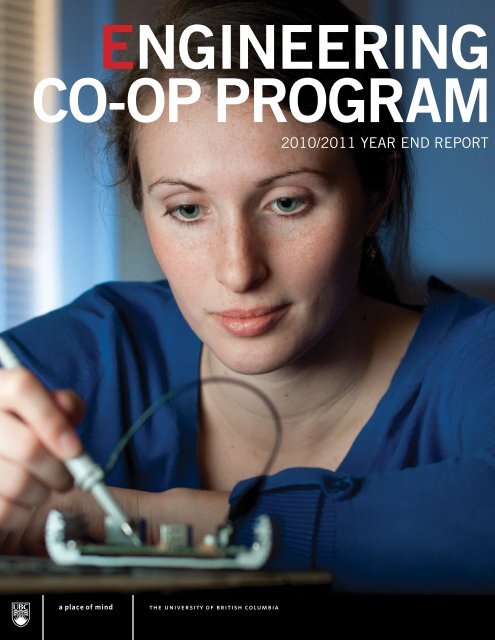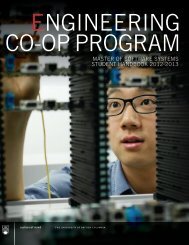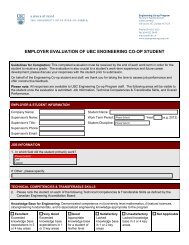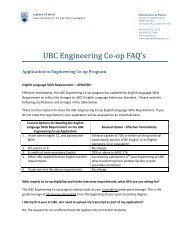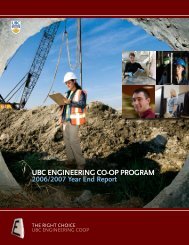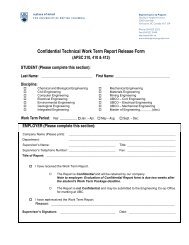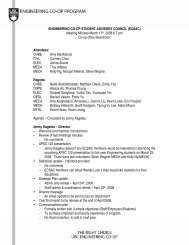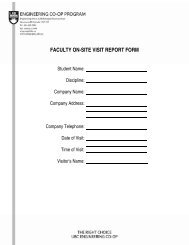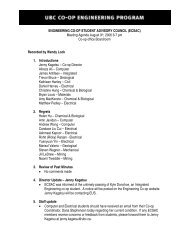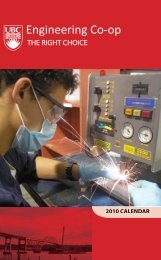ENGINEERING CO-OP PROGRAM
2010/2011 Year end report - Engineering Co-op Office - University ...
2010/2011 Year end report - Engineering Co-op Office - University ...
- No tags were found...
You also want an ePaper? Increase the reach of your titles
YUMPU automatically turns print PDFs into web optimized ePapers that Google loves.
<strong>ENGINEERING</strong><br />
<strong>CO</strong>-<strong>OP</strong> <strong>PROGRAM</strong><br />
2010/2011 Year End Report
<strong>CO</strong>NTENTS<br />
Program OverView<br />
Dean’s Message 4<br />
Program Director’s Message 5<br />
Program Overview 6<br />
Global Opportunities 7<br />
Student Salary Averages 7<br />
Engineering Programs<br />
Chemical and Biological Engineering 10<br />
Civil Engineering 11<br />
Computer Engineering 11<br />
Electrical Engineering 12<br />
Environmental Engineering 12<br />
Geological Engineering 13<br />
Integrated Engineering 14<br />
Materials Engineering 14<br />
Mechanical Engineering 15<br />
Mining Engineering 16<br />
Master of Engineering 17<br />
Master of Software Systems 17<br />
EVents<br />
Graduation Reception 21<br />
Junior Reception 21<br />
Award Winners 22-23<br />
Sponsorship Program Initiatives 23<br />
2<br />
UBC Okanagan 18-19
3
DEAN’S<br />
MESSAGE<br />
Dear Engineering Co-op partners,<br />
Thank you for supporting UBC Engineering Co-op throughout the<br />
2010/2011 academic year. Your active partnership—as employer,<br />
student or faculty member—is essential to the program’s success.<br />
Thank you to our industry partners for your incredible ongoing<br />
support through the good times and the bad times! Because of<br />
your support, we have been able to provide our students with<br />
invaluable industry work experience. We continue to explore new<br />
opportunities to enhance the services we provide. For example,<br />
in the near future we hope to approach you with the opportunity<br />
to define specific challenges that would require an “Engineering<br />
Co-op team” rather than one Co-op student. With the right team in<br />
place and under your guidance, we know our students can take on<br />
greater challenges as a team and deliver a complete solution for<br />
you. We are very proud of the trust you have placed in us and the<br />
support you have provided throughout the economic downturn. We<br />
continue to count on your support as the economy recovers.<br />
Thank you to our students. You have been exceptional representatives<br />
of UBC. We are proud of the contribution you are making to<br />
our society, even before you graduate. We know that this Co-op<br />
experience will be one that you will build on as you advance in<br />
your education and your profession. We continue to explore new<br />
opportunities for you. During the past year, we implemented a new<br />
stream through which you can now use a Co-op term to work for your<br />
own business, developing new product ideas under the mentorship<br />
of local entrepreneurs with established success records.<br />
Thank you to our faculty members. Your connection to the program<br />
ensures we continue to achieve our educational goals as we deliver<br />
on our commitment to industry.<br />
Considering this symbiotic relationship, a relationship dedicated<br />
to enhancing the quality of the educational experience of future<br />
engineers and to serving the needs of industry, it is no surprise<br />
that UBC Engineering Co-op has been on a trajectory of expansion<br />
over the past several years. It serves both UBC’s Vancouver<br />
and Okanagan campuses and industries not only in the Lower<br />
Mainland and Okanagan regions of British Columbia, but stretches<br />
across Canada and indeed reaches out to the whole world.<br />
Whether you are an industry partner providing that practical<br />
experience, a student gaining practical experience or a faculty<br />
member overseeing the two, you are helping us collectively make<br />
a world of difference by helping prepare our future engineers for<br />
their roles and responsibilities in serving society upon graduation.<br />
Thank you for your continued trust in the UBC Engineering Co-op<br />
Program.<br />
Sincerely,<br />
Dr. Tyseer Aboulnasr, O.ONT., FCAE, FEIC, P.Eng.<br />
Dean, Faculty of Applied Science<br />
Professor, Electrical Engineering<br />
4 4
Director’s<br />
Message<br />
Dear Co-op Supporters,<br />
It is my great pleasure to present the UBC Engineering Co-operative<br />
Education Program’s achievements and overall update in the<br />
2010/2011 Year End Report. The University of British Columbia<br />
truly is a Place of Mind and our Engineering Co-op students are<br />
contributing by using their engineering talents to help solve realworld<br />
problems.<br />
This year our Engineering Co-op students secured a total of 1,350<br />
four-month Co-op work terms; a four per cent increase compared to<br />
the previous year. This is a very positive sign as it shows that the<br />
economy and job market is slowly recovering from the recession<br />
that began in 2008. We also welcomed new Co-op students into the<br />
program this year: 403 second-years and 60 Master of Engineering<br />
students. They have all worked hard to prepare for their Co-op job<br />
searches and will embark on their first work terms in May 2011.<br />
Congratulations to our 263 Vancouver and 25 Okanagan Co-op<br />
students who successfully graduated with Co-op standing. We wish<br />
them the best as they set out on exciting career paths. The 2011<br />
graduating classes have participated in over 1,208 Co-op work terms<br />
- totaling over 4,832 months of relevant, technical, industry work<br />
experience. They have collectively earned over $15.5 million dollars<br />
in salaries during their time in the Engineering Co-op Program.<br />
The School of Engineering at the UBC campus in Kelowna received<br />
full accreditation in 2010 and the first Engineering graduates<br />
celebrated convocation in May 2010. At the Vancouver campus, we<br />
had several exciting developments which included officially moving<br />
into our renovated offices at the Pulp and Paper Centre. This space is<br />
designed for Co-op employers, students and staff. It includes seven<br />
interview rooms, a boardroom and employer lounge. We launched<br />
a new Employer Recruitment Guide, available in print and online,<br />
to promote the Engineering Co-op Program both here and abroad.<br />
The website received a fresh look and is now easier to navigate.<br />
The UBC Faculty of Applied Science and UBC Engineering Co-op<br />
Program recognize and support student-initiated entrepreneurship<br />
and launched a new Co-op Entrepreneurship initiative this year. We<br />
are pleased to be able to provide the opportunity for Engineering<br />
Co-op students who are interested in starting their own business<br />
to count one or more of their Co-op terms as Entrepreneurial Co-op<br />
work term experiences.<br />
A note of recognition and thanks is extended to our Co-op employers<br />
in Australia who were affected by floods and in Japan by earthquakes<br />
and the tsunami. They were of great assistance in ensuring the<br />
safety of our students who were working in these areas during a very<br />
difficult period.<br />
On behalf of the UBC Engineering Co-op Program, I would like<br />
to extend a big thank you to our students, employers, faculty and<br />
alumni. We value your continued support of the program. If you<br />
have any feedback, suggestions or questions on the program, please<br />
contact me directly at 604-822-6598 or jenny.reilly@ubc.ca.<br />
Sincerely,<br />
Jenny Reilly<br />
Director, UBC Engineering Co-op Program<br />
5 5
Program Overview<br />
UBC Engineering Co-op students participated in a total of 1,350 work terms where they gained relevant,<br />
technical and paid engineering experience in the 2010/2011 academic year. This year’s four per cent<br />
increase in the number of work terms secured is a positive reflection of the recent economic recovery.<br />
Sixty-two per cent of Co-op students worked within the Lower Mainland of B.C., 14 per cent within B.C.<br />
and 16 per cent within other Canadian provinces and territories. The remaining eight per cent of Co-op<br />
students ventured abroad and obtained international Co-op work term experience.<br />
2000<br />
Work Term Statistics 1994 to 2011<br />
TOTAL NUMBER OF WORK TERMS<br />
1500<br />
1000<br />
500<br />
0<br />
94/95<br />
95/96<br />
96/97<br />
97/98<br />
98/99<br />
99/00<br />
00/01<br />
01/02<br />
02/03<br />
03/04<br />
04/05<br />
05/06<br />
06/07<br />
07/08<br />
08/09<br />
09/10<br />
10/11<br />
ACADEMIC YEAR<br />
Industry Distribution<br />
Provincial Agency 6%<br />
Provincial Government 1%<br />
1% Federal Agency<br />
3% Federal Government<br />
5% Municipal Government<br />
2% Non Profit Organization<br />
By and large, the private sector ranging<br />
from consulting, mining, software<br />
development, academic research and<br />
construction, provided the most Co-op<br />
Engineering opportunities to 82 per<br />
cent of students. The public sector,<br />
including municipal, provincial and<br />
federal agencies, accounted for 16 per<br />
cent while two per cent of opportunities<br />
were in non-profit.<br />
82% Private Business<br />
6
Global Opportunities<br />
In 2010/2011 a total of eight per cent or 105 Co-op work terms were<br />
secured in 17 countries. Co-op students from all Engineering disciplines<br />
had the opportunity to combine their Co-op work experiences with travel<br />
interests during their international work term experiences. A majority of<br />
students worked in Germany, Hong Kong, Japan and the United States.<br />
However, students also ventured to unique destinations including<br />
Ecuador, Malawi, Sri Lanka,Tanzania and the United Arab Emirates.<br />
In 2010/2011 UBC Engineering Co-op<br />
students employed in Canada reported<br />
an average monthly salary of $3,202.<br />
Co-op students collectively earned an<br />
impressive $17 million in salaries,<br />
up three million from last year. The<br />
following table shows the mean<br />
monthly salary for UBC Engineering<br />
Co-op students from our UBC<br />
Vancouver and Okanagan campuses<br />
who participated in domestic industry<br />
Engineering Co-op work terms.<br />
Student Salary Averages<br />
Discipline 2nd Year 3rd Year 4th Year<br />
Chemical & Biological $2,566 $3,134 $3,796<br />
Civil $2,948 $3,121 $3,321<br />
Computer $2,638 $2,863 $2,966<br />
Electrical $2,735 $2,942 $2,962<br />
Environmental $2,552 $2,814 $2,899<br />
Geological $3,121 $3,136 $3,271<br />
Integrated $2,305 $2,890 $3,161<br />
Mechanical $2,712 $2,830 $3,184<br />
Materials $2,350 $3,065 $3,126<br />
Mining $3,570 $3,909 $3,995<br />
Masters of Software Systems N/A N/A $3,538<br />
Master of Engineering N/A N/A $3,213<br />
Please note: these figures do not include academic or international salaries and do not show the variances between small and large industries.<br />
7
engineering<br />
Programs<br />
8
WORK TERMS HAVE BEEN <strong>CO</strong>MPLETED<br />
BY <strong>CO</strong>-<strong>OP</strong> STUDENTS SINCE 1980<br />
OF <strong>CO</strong>-<strong>OP</strong> EMPLOYERS INTERESTED<br />
IN HIRING <strong>CO</strong>-<strong>OP</strong> GRADUATES<br />
<strong>CO</strong>-<strong>OP</strong> EMPLOYER PARTNERSHIPS<br />
the 2010 Graduating <strong>CO</strong>-<strong>OP</strong> STUDENTS <strong>CO</strong>LLECTIVELY EARNED<br />
IN SALARIES<br />
9
Chemical and Biological Engineering<br />
www.chbe.ubc.ca<br />
Option Specializations<br />
• Biological Engineering<br />
• Environmental Engineering<br />
• Process Engineering<br />
With over 109 Chemical and Biological Engineering<br />
Co-op students successfully securing work terms<br />
last year, the program increased by nine per cent<br />
compared to the previous year. Chemical and<br />
Biological Engineering Co-op students continue<br />
to enhance their strong background knowledge in<br />
the physical sciences, mathematics, and process<br />
engineering. Through options in Biological,<br />
Environmental and Process Engineering programs,<br />
students have been exposed to a variety of unique<br />
opportunities and industry knowledge ranging from<br />
biotechnology, municipal wastewater management,<br />
environmental testing and process engineering in<br />
the oil and gas sector.<br />
The oil and gas sector once again provided the<br />
most opportunities for students, hiring over 19<br />
per cent, while positions in research and design<br />
related to the manufacture of fuel cells saw steady<br />
increases in 2010/2011. The majority of Co-op<br />
students worked in the Lower Mainland of B.C.,<br />
while ten per cent ventured outside Canada to<br />
accept positions in Japan, Peru, Korea, Taiwan and<br />
various locations in the United States of America.<br />
historical work terms<br />
150<br />
120<br />
90<br />
60<br />
30<br />
0<br />
94/95 95/96 96/97 97/98 98/99 99/00 00/01 01/02 02/03 03/04 04/05 05/06 06/07 07/08 08/09 09/10 10/11<br />
industry distribution<br />
4% Government<br />
Mining/Metals Refining 8%<br />
9% Academic Research<br />
13% Other<br />
Oil & Gas 19%<br />
Manufacturing/R&D - Various 22%<br />
25% Consulting - Various<br />
10
civil Engineering<br />
www.civil.ubc.ca<br />
www.ubc.ca/okanagan/engineering<br />
Option Specializations<br />
• Environmental Engineering<br />
300<br />
270<br />
historical work terms<br />
Throughout the 2010/2011 year, 262 Co-op work terms were<br />
secured by the Civil Engineering Co-op students. During<br />
the fall 2010 and winter 2011 work terms, 100 per cent<br />
of students seeking employment were successful in finding<br />
suitable positions. The large majority of students worked<br />
within the Lower Mainland of B.C. Twenty-two per cent worked<br />
across Canada and seven per cent travelled further afield to<br />
international destinations including Australia, Germany, Hong<br />
Kong and New Zealand.<br />
Civil Engineering Co-op students worked on a variety of<br />
projects. A few noteworthy opportunities included the design<br />
and construction of bridges and roads for infrastructure<br />
upgrades across Canada. Government and municipal offices<br />
provided 68 Co-op work terms in departments such as marine<br />
structures, fisheries and oceans, traffic, utilities and waste<br />
management. In Hong Kong, some students were involved<br />
in a large drainage project utilizing the revolutionary Tunnel<br />
Boring Machine while those in Australia were exposed to a<br />
variety of geotechnical testing relative to exploration and<br />
mining. Locally, students were involved with various aspects<br />
of the Port Mann/Highway #1 upgrade.<br />
NUMBER OF WORK TERMS<br />
240<br />
210<br />
180<br />
150<br />
120<br />
90<br />
60<br />
30<br />
0<br />
94/95 95/96 96/97 97/98 98/99 99/00 00/01 01/02 02/03 03/04 04/05 05/06 06/07 07/08 08/09 09/10 10/11<br />
Materials Testing 8%<br />
Government 23%<br />
ACADEMIC YEAR<br />
industry distribution<br />
Utility Company 3%<br />
8% Other<br />
17% Construction<br />
41% Consulting - Various<br />
Computer Engineering<br />
www.ece.ubc.ca<br />
Option Specializations<br />
• Software Engineering<br />
150<br />
historical work terms *<br />
A total of 110 Computer Engineering Co-op students<br />
successfully obtained work terms in 2010/2011. The results<br />
were extremely positive for the fall 2010 and winter 2011<br />
terms whereby 100 per cent of students obtained employment.<br />
These students developed their hands-on skills in software<br />
testing and development. They also gained insights and<br />
industry knowledge in a wide variety of industries including<br />
aviation, biomedical software and telecommunications.<br />
NUMBER OF WORK TERMS<br />
135<br />
120<br />
105<br />
90<br />
75<br />
60<br />
45<br />
30<br />
Reflecting the upward trend in the software industry, the<br />
total number of job postings increased by three per cent from<br />
1,369 to 1,412 compared to the previous year. There were<br />
new Co-op employers in the alternative energy, biomedical<br />
and semiconductor field joining the Co-op program providing<br />
software-related experiences in the Lower Mainland of B.C.<br />
While a large majority of Co-op students remained in the Lower<br />
Mainland of B.C., seven per cent travelled abroad to Hong<br />
Kong, Japan, Taiwan and the United States of America.<br />
15<br />
0<br />
00/01 01/02 02/03 03/04 04/05 05/06 06/07 07/08 08/09<br />
ACADEMIC YEAR<br />
*Prior to 2000/2001, the Electrical and Computer Engineering programs were combined.<br />
industry distribution<br />
5% Academic Research<br />
7% Telecommunications<br />
09/10<br />
10/11<br />
10% Other<br />
7% Finance, Insurance / Real Estate<br />
2% Government<br />
49% Software Development<br />
20% Manufacturing/R&D - Various<br />
11
Electrical Engineering<br />
www.ece.ubc.ca<br />
www.ubc.ca/okanagan/engineering<br />
Option Specializations<br />
• Biomedical Engineering<br />
• Electrical Energy Systems Engineering<br />
• Nanotechnology and Microsystems Engineering<br />
Electrical Engineering Co-op students completed a total of<br />
194 work terms, a slight decrease compared to 2009/2010.<br />
However, 100 per cent of students successfully obtained<br />
employment for the fall 2010 and winter 2011 work terms.<br />
They gained hands-on industry experience in research and<br />
development, software, finance, telecommunications and<br />
consulting. Notable projects included B.C. Place electrical<br />
upgrades, iPhone application developments, high level policy<br />
research for electrical energy systems and GPS field testing.<br />
Eighty per cent of Electrical Engineering Co-op students<br />
remained in the Lower Mainland of B.C. while 15 per cent<br />
relocated within British Columbia and Canada. Five per cent<br />
gained international experience in Germany, Hong Kong,<br />
Sri Lanka and the United States of America.<br />
NUMBER OF WORK TERMS<br />
350<br />
315<br />
280<br />
245<br />
210<br />
175<br />
140<br />
105<br />
70<br />
35<br />
0<br />
historical work terms *<br />
94/95 95/96 96/97 97/98 98/99 99/00 00/01 01/02 02/03 03/04 04/05 05/06 06/07 07/08 08/09 09/10 10/11<br />
ACADEMIC YEAR<br />
*Prior to 2000/2001, the Electrical and Computer Engineering programs were combined.<br />
industry distribution<br />
8% Academic Research<br />
5% Utility Company<br />
7% Telecommunications<br />
11% Consulting - Various<br />
26% Software Development<br />
12% Other<br />
10% Aerospace/Aviation<br />
21% Manufacturing/R&D - Various<br />
Environmental<br />
www.enve.ubc.ca<br />
A total of 19 Environmental Engineering Co-op students gained<br />
Co-op experiences in 2010/2011. In summer 2010, 80 per<br />
cent of the Co-op students secured employment while the fall<br />
2010 and winter 2011 work terms were very successful with a<br />
100 per cent success rate respectively.<br />
Students worked on projects ranging from groundwater<br />
monitoring to analyzing the performance of fuel cell membranes.<br />
This was the first year that Environmental Engineering Co-op<br />
students began working in the mining industry and the results<br />
have been positive. Fifty-eight per cent of Co-op students<br />
worked outside of the Lower Mainland of B.C. while 42 per<br />
cent relocated within British Columbia, Alberta and the United<br />
States of America.<br />
NUMBER OF WORK TERMS<br />
25<br />
20<br />
15<br />
10<br />
5<br />
0<br />
historical work terms<br />
05/06 06/07 07/08 08/09 09/10 10/11<br />
ACADEMIC YEAR<br />
industry distribution<br />
16% Utility Company<br />
5% Government<br />
11% Professional Services<br />
31% Consulting - Various<br />
32% Mining-Metals Refining<br />
5% Academic Research<br />
12
Geological Engineering<br />
www.geoeng.ubc.ca<br />
Option Specializations<br />
• Applied Geophysics Engineering<br />
• Environmental Engineering<br />
• Geotechnical Engineering<br />
• Minerals and Fuels Exploration Engineering<br />
As the year progressed for the summer 2010, fall<br />
2010, and winter 2011 terms, the percentage of<br />
students securing work increased from 79 to 100 per<br />
cent to 100 per cent respectively. In 2010/2011,<br />
30 Geological Engineering Co-op students were<br />
engaged in projects including analyzing soil in labs<br />
to monitoring tailings dam in the Alberta oil sands.<br />
The majority of students worked in geotechnical<br />
and environmental consulting, they also worked<br />
for mining companies and were also involved in<br />
materials testing for the construction industry.<br />
50<br />
45<br />
historical work terms<br />
NUMBER OF WORK TERMS<br />
40<br />
35<br />
30<br />
25<br />
20<br />
15<br />
10<br />
5<br />
0<br />
00/01<br />
01/02<br />
02/03<br />
03/04<br />
04/05<br />
05/06<br />
06/07<br />
07/08<br />
08/09<br />
09/10<br />
10/11<br />
ACADEMIC YEAR<br />
industry distribution<br />
3% Oil & Gas<br />
20% Construction<br />
27% Mining/Metals Refining<br />
17% Consulting - Various<br />
33% Materials Testing<br />
13 13
Integrated Engineering<br />
www.igen.ubc.ca<br />
In 2010/2011, 23 Integrated Engineering Co-op work<br />
terms were secured - a 30 percent decrease compared to<br />
the previous year. The UBC Integrated Engineering Program<br />
provides students with a project focused, design-based,<br />
interdisciplinary education with a strong technical foundation.<br />
Integrated Engineering Co-op students enter the engineering<br />
workforce with enhanced team-based design experience<br />
through core courses and elective courses in at least two of<br />
the traditional engineering disciplines.<br />
Some of the innovative projects Co-op students were involved<br />
in included the design and testing of high-tech snowboarding<br />
goggles in Whistler, sophisticated laser research in Germany,<br />
building envelope assessments in Alberta and fuel cell<br />
prototype testing in the Lower Mainland of B.C.<br />
NUMBER OF WORK TERMS<br />
40<br />
35<br />
30<br />
25<br />
20<br />
15<br />
10<br />
5<br />
0<br />
01/02<br />
historical work terms<br />
02/03 03/04 04/05 05/06 06/07 07/08 08/09 09/10 10/11<br />
ACADEMIC YEAR<br />
industry distribution<br />
9% Professional Services<br />
8% Other<br />
13% Academic Research<br />
13% Construction<br />
31% Manufacturing/R&D - Various<br />
22% Consulting - Structural/Architecture<br />
4% Government<br />
Materials Engineering<br />
www.mtrl.ubc.ca<br />
Option Specializations<br />
• Biomaterials Engineering<br />
• Manufacturing and Performance Engineering<br />
• Minerals and Metals Extraction Engineering<br />
In 2010/2011, 36 Materials Engineering Co-op students<br />
secured work term experiences in a variety of industries. Total<br />
work term numbers steadily climbed from 72, 89 and 100 per<br />
cent for the summer 2010, fall 2010 and winter 2011 terms<br />
respectively.<br />
Materials Engineering Co-op students gained experience on<br />
projects ranging from quality control for aluminum casting to<br />
pulp fiber testing. They worked mostly with companies related<br />
to the automotive and the resource industries. Students<br />
worked in fuel cell laboratories, aluminum, manufacturing and<br />
steel plants, as well as academic research positions.<br />
NUMBER OF WORK TERMS<br />
100<br />
80<br />
60<br />
40<br />
20<br />
0<br />
historical work terms<br />
95/96 96/97 97/98 98/99 99/00 00/01 01/02 02/03 03/04 04/05 05/06 06/07 07/08 08/09 09/10 10/11<br />
6% Agriculture<br />
ACADEMIC YEAR<br />
industry distribution<br />
22% Mining/Metals Refining<br />
30% Academic Research<br />
3% Materials Testing<br />
6% Other<br />
19% Manufacturing/R&D - Various 14% Consulting - Various<br />
14
Mechanical Engineering<br />
www.mech.ubc.ca<br />
www.ubc.ca/okanagan/engineering<br />
Option Specializations<br />
• Biomedical Engineering<br />
• Mechatronics Engineering<br />
• Thermofluids Engineering<br />
In 2010/2011, the Mechanical Engineering Co-op<br />
program began to see some stabilization in<br />
employment opportunities after experiencing a<br />
decline in opportunities since the 2008 economic<br />
recession began. Although there continued to be<br />
challenges for students, because of the economic<br />
recovery, 285 Mechanical Engineering students<br />
were successful in securing work terms.<br />
The majority of Co-op students were employed in<br />
manufacturing, consulting (with sub-concentration<br />
in HVAC) and academic research with the greatest<br />
concentration of work terms in Metro Vancouver,<br />
followed by international locations. Forty-one<br />
students gained enriching cooperative education<br />
experiences in a variety of countries including<br />
Germany, Indonesia, Japan, Taiwan and the United<br />
Arab Emirates.<br />
While Co-op provides industrial experience<br />
enhancing students’ theoretical and project<br />
courses, our students are also developing and<br />
applying their engineering skill sets through active<br />
involvement in the Engineering student teams<br />
(e.g. Thunderbots, Formula SAE, Aerodesign Heavy<br />
Lift and SAE Supermilage car), competitions<br />
(e.g. Western Engineering Competition) and clubs<br />
such as Engineers Without Borders.<br />
400<br />
historical work terms<br />
360<br />
NUMBER OF WORK TERMS<br />
320<br />
280<br />
240<br />
200<br />
160<br />
120<br />
80<br />
40<br />
0<br />
93/94 94/95 95/96 96/97 97/98 98/99 99/00 00/01 01/02 02/03 03/04 04/05 05/06 06/07 07/08 08/09 09/10 10/11<br />
ACADEMIC YEAR<br />
industry distribution<br />
10% Mining/Metals Refining<br />
4% Oil & Gas<br />
9% Academic Research<br />
14% Other<br />
5% Construction<br />
37% Manufacturing/R&D-Various<br />
17% Consulting - Various<br />
4% Aerospace/Aviation<br />
15
Mining Engineering<br />
www.mining.ubc.ca<br />
Option Specializations<br />
• Mining Engineering<br />
• Processing Engineering<br />
The mining industry provided clear evidence of<br />
economic recovery and what was in store for the future.<br />
A total of 86 Mining Engineering Co-op students<br />
secured Co-op work terms, a six per cent increase<br />
compared to the previous year. For the summer<br />
2010, fall 2010 and winter 2011 terms, placements<br />
increased from 89, 100 to 100 per cent respectively.<br />
Students were involved in mining commodities<br />
such as copper, coal, diamonds, potash, gold, oil,<br />
molybdenum, nickel, zinc, and uranium. Tasks that<br />
students were assigned ranged from underground drill<br />
and blast design to haul truck cycle studies. Fourteen<br />
per cent of students worked in the Lower Mainland of<br />
B.C. while the remaining 87 per cent relocated within<br />
Canada or worked abroad.<br />
100<br />
90<br />
historical work terms<br />
NUMBER OF WORK TERMS<br />
80<br />
70<br />
60<br />
50<br />
40<br />
30<br />
20<br />
10<br />
0<br />
97/98 98/99 99/00 00/01 01/02 02/03 03/04 04/05 05/06 06/07 07/08 08/09 09/10 10/11<br />
ACADEMIC YEAR<br />
industry distribution<br />
7% Oil & Gas<br />
8% Academic Research<br />
12% Consulting - Various<br />
73% Mining/Metals Refining<br />
16
Master of Engineering<br />
www.engineering.ubc.ca/meng<br />
SPECIALIZATIONS OF MASTER OF <strong>ENGINEERING</strong><br />
• Biomedical<br />
• Geological<br />
• Chemical & Biological • Materials<br />
• Civil<br />
• Mechanical<br />
• Clean Energy<br />
• Mining<br />
• Electrical & Computer<br />
The Master of Engineering is a course-based professional program<br />
designed for Engineering graduates who wish to complement engineering<br />
courses with management knowledge. Since its inception in 2007, the<br />
program’s enrollment numbers have grown significantly. In less than five<br />
years, the total number of work terms secured grew from five to 73 work<br />
terms. In comparison to 2009/2010, the program saw over a 300 per<br />
cent increase in part to the addition of the Master of Engineering in Clean<br />
Energy program.<br />
NUMBER OF WORK TERMS<br />
75<br />
60<br />
45<br />
30<br />
15<br />
0<br />
historical work terms<br />
07/08 08/09 09/10 10/11<br />
ACADEMIC YEAR<br />
In its first year, the Clean Energy program’s 12 Co-op students successfully<br />
completed Co-op work terms starting in summer 2010 and gained handson<br />
experience in Clean Energy Engineering with a variety of employers<br />
across BC and in Germany. The program is targeted to students who are<br />
interested in advanced training related to environmentally-advantageous<br />
energy-efficient technologies — technologies that will help meet the<br />
global need for energy while reducing electricity and greenhouse gases<br />
and other emissions.<br />
industry distribution<br />
5% Municipal Government<br />
11% Provincial Agency<br />
Sixty-three per cent of the Master of Engineering Co-op students<br />
remained in the Lower Mainland of B.C., 22 per cent worked within<br />
British Columbia and 11 per cent were located within Canada. Four per<br />
cent gained international experience in Germany and the United States<br />
of America.<br />
84% Private Business<br />
Master of Software Systems<br />
www.icics.ubc.ca/mss<br />
In fall 2010, 25 Master of Software Systems Co-op students<br />
enrolled in the program and 100 per cent successfully<br />
secured Co-op work terms. The UBC Engineering Co-op<br />
Program facilitates a mandatory four-month Co-op work<br />
term placement for the Master of Software Systems Degree<br />
Program, administered through UBC’s Institute for Computing,<br />
Information and Cognitive Systems (ICICS). Master of Software<br />
Systems have completed an undergraduate degree in science,<br />
engineering or social sciences and bring a multidisciplinary<br />
approach and international industry experience to the work<br />
environment.<br />
The students assisted with the development and testing of<br />
software for the finance and real estate, telecommunication,<br />
semiconductor and business intelligence industries in<br />
the Lower Mainland of B.C. and across Canada. While the<br />
majority of the students worked in the Lower Mainland of<br />
B.C., one relocated to Seattle, Washington while eight others<br />
worked in Kelowna, Calgary, Markham, Mississauga, Ottawa<br />
and Waterloo.<br />
NUMBER OF WORK TERMS<br />
historical work terms<br />
30<br />
27<br />
24<br />
21<br />
18<br />
15<br />
12<br />
9<br />
6<br />
3<br />
0<br />
00/01 01/02 02/03 03/04 04/05 05/06 06/07 07/08 08/09 09/10<br />
ACADEMIC YEAR<br />
industry distribution<br />
12% Other<br />
12% Academic Research<br />
4% Finance, Insurance & Real Estate<br />
8% Consulting - Various<br />
4% Telecommunications<br />
10/11<br />
16% Manufacturing/R&D - Various<br />
40% Software Development<br />
4% Oil & Gas<br />
17
engineering<br />
ubc okanagAN<br />
18
UBC OKANAGAN - Civil, Electrical & Mechanical<br />
www.ubc.ca/okanagan/engineering<br />
The UBC Okanagan Engineering Program celebrated<br />
the graduation of 25 Engineering Co-op students with<br />
Co-op standing on their degree parchments this year.<br />
A total of 114 Co-op work terms were successfully<br />
secured by students in 2010/2011 in Civil, Electrical<br />
and Mechanical Engineering at UBC Okanagan.<br />
Construction and consulting sectors provided the most<br />
opportunities for students, other students explored<br />
opportunities within various government departments.<br />
Students also secured work terms in mining,<br />
manufacturing, academics and software development.<br />
Twenty-two per cent of UBC Okanagan Engineering<br />
Co-op students were employed in the Lower Mainland<br />
of B.C. while the majority of students, 57 per cent,<br />
worked in the Okanagan and different regions in British<br />
Columbia. The remaining 20 per cent worked across<br />
the rest of Canada and just one per cent of the students<br />
gained international experience in Australia.<br />
industry distribution<br />
6% Academic Research<br />
civil engineering<br />
8% Transportation Operations<br />
10% Materials Testing<br />
8% Other<br />
4% Mining/Metals Refining<br />
21% Government<br />
25% Construction<br />
18% Consulting - Various<br />
electrical engineering<br />
10% Utility Company<br />
20% Software Development<br />
20% Government - Municipal<br />
10% Manufacturing/R&D<br />
- Computers/Electronics<br />
10% Retail / Distributor<br />
30% Consulting - IT Services<br />
mechanical engineering<br />
10% Oil & Gas<br />
10% Academic Research<br />
5% Wood Processing<br />
10% Mining/Metals Refining<br />
21% Construction<br />
21% Manufacturing/R&D - Various<br />
18% Consulting - Various<br />
5% Pulp & Paper<br />
NUMBER OF WORK TERMS<br />
80<br />
70<br />
60<br />
50<br />
40<br />
30<br />
20<br />
10<br />
historical work terms<br />
CIVIL<br />
ELECTRICAL<br />
MECHANICAL<br />
0<br />
07/08<br />
08/09<br />
09/10<br />
10/11<br />
ACADEMIC YEAR<br />
19
engineering<br />
Events<br />
20
J u n i o r<br />
R e c e p t i o n<br />
The annual Junior Reception welcomed new Engineering Co-op students from all Engineering disciplines into the program. In 2010 a<br />
total of 403 Engineering undergraduates, 359 from Vancouver and 44 from Okanagan, were invited to attend.<br />
The fifth annual UBC Engineering Co-op Junior Reception in the Vancouver campus took place on January 26, 2011 and the fourth<br />
annual reception in the Okanagan was on February 23, 2011. Both events provided an opportunity for Co-op students to celebrate the<br />
start of their Engineering Co-op journey and to network with industry representatives.<br />
G r a d u at i o n R e c e p t i o n<br />
UBC Vancouver<br />
The Engineering Co-op 2011 Graduation Reception was held on March 3rd at the Vancouver Marriot Pinnacle Hotel. A total of 263<br />
Engineering Co-op graduates from all disciplines successfully graduated with Co-op standing. Students, faculty and industry representatives<br />
enjoyed an evening of networking, food and festivities.<br />
UBC Okanagan<br />
The Engineering Co-op Graduating Class of 2011 from the Okanagan campus was celebrated by students, faculty and industry<br />
representatives on March 16th at the Manteo Resort. A total of 25 Engineering Co-op students from the Okanagan successfully graduated<br />
with Co-op standing.<br />
21
Student, Faculty &<br />
of the Year Award<br />
Each year the Student, Employer and Faculty Member of the Year awards are presented to those who have<br />
This year, the selection committee had the honour of presenting the awards to this year’s winners<br />
Student of the Year<br />
Vancouver<br />
Naeem Mawji, Chemical and Biological Engineering Co-op student,<br />
has actively engaged in his academics, his availing of opportunities<br />
outside of the classroom, as well as his willingness to move beyond<br />
the immediate community by taking part in an international service<br />
learning project. Naeem has developed the skills and networks<br />
necessary to support his interest in alleviating poverty and improving<br />
the quality of life in rural Tanzania. He does this by providing<br />
electrical power to these communities. Naeem’s idea germinated<br />
through a UBC international service learning project and it has<br />
now grown into a company that he co-founded. He has received<br />
funding for the company from the World Bank. Naeem successfully<br />
completed five work terms, three in industry with Syncrude Canada,<br />
one in research with Dr. Tony Bi of the Dept. of Chemical and<br />
Biological Engineering and his final work term with the company he<br />
co-founded, Carbon X Energy, in Tanzania.<br />
Okanagan<br />
Holly Rourke, a Civil Engineering Co-op student, successfully<br />
completed all five Co-op work-terms. She obtained her first<br />
two with Thurber Engineering in the Lower Mainland of B.C.;<br />
her third as a Research Assistant with an engineering faculty<br />
member at the UBC Okanagan; and relocated across the Pacific<br />
Ocean to Australia for her final two terms with SRK Consulting.<br />
She received high praise from her previous employers and was<br />
noted for her contributions. She has always managed to be<br />
on the forefront whether it is the Engineering Co-op Student<br />
Advisory Committee (ECSAC) or the UBC Okanagan Engineering<br />
Undergraduate Society or helping a faculty member in Lab<br />
development or coordinating efforts for Canadian Society<br />
for Civil Engineering (CSCE) and Association of Professional<br />
Engineers and Geoscientists of British Columbia (APEGBC) as a<br />
UBC Okanagan representative.<br />
Faculty of the Year<br />
Vancouver<br />
Dr. David Dreisinger is a respected professor in the Materials<br />
Engineering Department, Vice President of Metallurgy for Baja<br />
Mining, and the chair holder of the Industrial Research Chair in<br />
Hydrometallurgy. Dr. Dreisinger has held the Research Chair for<br />
nearly 20 years with over 20 current industry partners. At UBC,<br />
he is actively involved in hydrometallurgy research. Not only<br />
does he teach the subject to students but he has also facilitated<br />
the development of students in the field by supervising graduate<br />
students, research engineers as well as hiring Co-op students.<br />
Over the past seven years, he has directly hired 14 Co-op<br />
students to work on his research projects - 34 per cent of the<br />
total hiring by the entire department during that period. He<br />
is passionate about preparing students to be future leaders in<br />
industry.<br />
Okanagan<br />
Dr. Mina Hoorfar has been an Assistant Professor at the University<br />
of British Columbia Okanagan since 2005 and is the head of<br />
the Advanced Thermo-Fluidic Laboratory (ATFL). Her key areas<br />
of research are Proton Exchange Membrane (PEM) Fuel Cells,<br />
Microfluidic Fuel Cells, Digital Microfluidics, Real-time Water<br />
Quality Monitoring, and In Vitro Red Wine Characterization<br />
through Interfacial Property Measurement. She earned a spot on<br />
the prestigious Teaching Honor Roll at UBC Okanagan. She is a<br />
strong supporter of the Co-op program and assists students in<br />
pursuing their research aspirations through regular mentoring and<br />
coaching. The ability to consistently recruit a high percentage of<br />
students through NSERC USRA is due to her strong commitment<br />
and encouragement. Dr. Hoorfar has hired four students since<br />
2007 and has provided students practical and real-world related<br />
work experiences in engineering along with exposure to publishing<br />
and presenting papers in peer-reviewed journals and conferences.<br />
22<br />
Student of the Year, Naeem Mawji,<br />
Chemical & Biological Engineering<br />
Student of the Year, Holly Rourke,<br />
Civil Engineering<br />
Faculty of the Year, Dr. David Dreisinger,<br />
Professor of Material Engineering<br />
Faculty of the Year, Dr. Mina Hoorfar,<br />
Assistant Professor, School of Engineering
Employer<br />
Winners<br />
made outstanding contributions to the Co-op Program.<br />
at both the Vancouver and Okanagan campuses.<br />
Employer of the Year<br />
Vancouver<br />
Teck Resources, Canada’s largest diversified mining, mineral<br />
processing and metallurgical company, has been an active<br />
participant and supporter of the UBC Engineering Co-op Program<br />
since 1995; providing over 600 work term opportunities to our<br />
students. In 2010, Teck Resources hired 37 Co-op students<br />
including 14 Mechanical, eight Mining, three Civil, three<br />
Chemical, three Geological, three Electrical, two Environmental<br />
and one Master of Engineering Mining. Teck Resources’<br />
established Co-op program and presence amongst our students<br />
is as strong today as it was when they first hired a UBC<br />
Engineering Co-op student. They have provided outstanding<br />
experiential work experiences to every level of engineering<br />
student; while offering competitive salaries and unparalleled<br />
preparation for the world after graduation.<br />
Okanagan<br />
Kiewit has been a leader in the engineering, construction and<br />
mining industries throughout Canada since the early 1940s.<br />
Since 2008 Kiewit has been proactive in their recruiting efforts<br />
by conducting info sessions, on-site interviews and posting<br />
and hiring with the UBC Engineering Co-op Program at the<br />
Vancouver and Okanagan campuses. Kiewit has provided 28<br />
Engineering Co-op placements since 2008 for 13 Civil and 15<br />
Mechanical Engineering students. In 2010 Kiewit provided<br />
relevant technical, engineering-related work experiences along<br />
with competitive salaries to students of all levels — juniors,<br />
intermediates and seniors for 14 UBC Okanagan students: four<br />
Civil and four Mechanical.<br />
Sponsorship<br />
Program<br />
Initiatives<br />
This year the UBC Engineering Co-op Program raised<br />
a phenomenal total of $35,500 through the marketing<br />
of our comprehensive sponsorship package. This year’s<br />
sponsors will enable the program to connect with<br />
students, employers and faculty members throughout<br />
the year at organized events and activities including:<br />
• Junior Reception (UBC Vancouver & Okanagan)<br />
• Graduation Reception (UBC Vancouver & Okanagan)<br />
• National Co-op Week<br />
• UBC Engineering Co-op Photo Contest<br />
Platinum Sponsor<br />
Goldcorp Inc.<br />
Gold SponsorS<br />
Grande Cache Coal<br />
Peter Kiewit Infrastructure<br />
Metro Vancouver<br />
MDA Corporation<br />
Teck<br />
Silver SponsorS<br />
CH2M Hill<br />
FortisBC<br />
Incognito Software Inc.<br />
Jacobs - Aker Solutions<br />
SNC-Lavalin<br />
Bronze SponsorS<br />
Ledcor<br />
MMM Group<br />
Employer of the Year, Teck<br />
Ross Pritchard, Alberto Gonzalez,<br />
Susan Stocker & Rudy Zdravlje<br />
Employer of the Year, Kiewit<br />
Johnny Phung<br />
23
<strong>CO</strong>NTACT US<br />
UBC <strong>ENGINEERING</strong> <strong>CO</strong>-<strong>OP</strong> <strong>PROGRAM</strong><br />
604.822.3022<br />
250.807.9279<br />
www.ubcengineeringcoop.com<br />
Principal Design: Patrick Blaeser Principal Photography: Martin Dee


